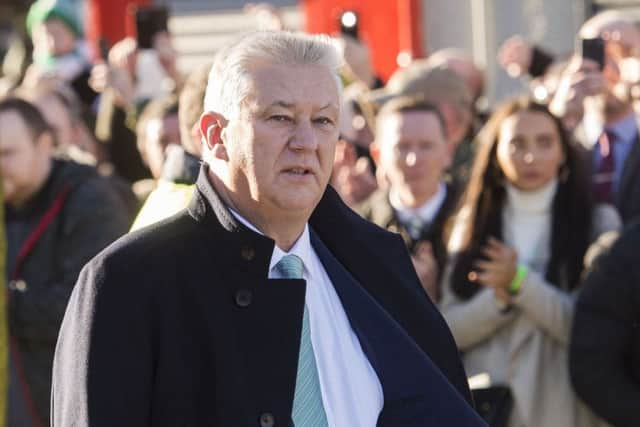Peter Lawwell: Celtic worth more to Scotland than golf
The report by the Fraser of Allander Institute at the University of Strathclyde shows that Celtic generated a gross of £165 million to Scotland’s GDP in 2016-17.
That figure is £10m more than the equivalent amount in the most recent study into golf tourism’s impact.
Advertisement
Hide AdAdvertisement
Hide AdHalf of the expenditure comes directly from money spent by Celtic and their supporters around games, but spreads beyond the matchday experience itself with spending on hotels, transport, food and drink.


Celtic commissioned the study after becoming increasingly frustrated by what they regard as an overtly negative view of Scotland’s national sport from the authorities.
“Over time, we felt that Celtic and Scottish football had been really undervalued in terms of the economic contribution it makes,” Lawwell told The Scotsman.
“In terms of headlines from government, it has been mainly negative – the Offensive Behaviour at Football Act, talk of strict liability – but we felt there is a lot of good which comes out of football, which comes out of Celtic, so we should have an independent study that would try to reflect that.
“We chose Fraser of Allander, because they are world class in what they do, so that gives it status and independence. We were delighted with the outcome, although we kind of expected it. The contribution to GDP, the jobs we help to create and support are really good.
“To put it in context, Celtic generates more for the Scottish economy per annum than golf tourism. That’s a remarkable comparator.
“The contributions that Celtic and Scottish football make to the country – economically, socially and culturally – is sometimes forgotten. There are a lot of positive fundamentals in this report we can hopefully start a debate around.”
The Scottish champions have received planning permission for a £18m club hotel and museum development at Celtic Park. But they remain in dispute with the local council over the contentious proposal of a parking exclusion zone around the stadium which has incensed fans.
Advertisement
Hide AdAdvertisement
Hide Ad“For us, it’s about partnership,” added Lawwell. “We would like to talk to Glasgow City Council about tourism in the city. Can we help each other? Can we have Celtic Park as a destination? Can we talk about public transport infrastructure which might help us both?
“There is a bugbear at the moment over the proposed parking zone, which we think is nonsense. We believe we are good neighbours. So, if there are things we can improve upon, let’s talk about that instead of having draconian impositions such as not being able to park your car within a kilometre of Celtic Park.
“That inconveniences our supporters who are adding to the economic benefit of the city and the country.
“We would like to have Celtic and football recognised for what it does. Let’s sit down with the relevant bodies, let’s be positive and look at ways of maximising the potential of football so that everyone wins. Our relationship with the council is generally fine. But this is one issue which is an irritant to us. We don’t see the point in it.”
The Fraser of Allander report further underlines Celtic’s current economic health after the club’s most recent annual accounts showed record revenue of £101.6m, a profit of £17.3m and cash at the bank of £27m. Lawwell, who will face shareholders at Celtic’s annual general meeting today, insists his club are ideally placed for potential changes to the landscape of European football as Uefa look to revamp their club competitions.
“We are in as good a financial state as we have ever been in, which allows us to face the challenges going forward,” he said.
“There will be changes in European competition. The Europa League will change from 2021, which is an opportunity for Scotland as a nation to try to get more teams into the group stages.
“For me, the transformer for Scottish football will be to get more teams into regular European competition. If we can in any way try to help that, we will. It will make the Premiership a more competitive and better-funded league.”
Advertisement
Hide AdAdvertisement
Hide AdLawwell also welcomed the new TV contract which will see Sky Sports have exclusive live rights to the Premiership from 2020 and is worth around £30m a year.
“In all circumstances, it’s a good deal,” said Lawwell. “Taking everything into account, the guys did a good job negotiating it and we move on.”